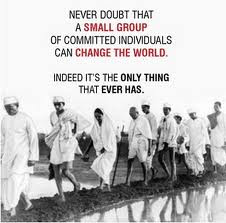The term Indian Independence Movement encompasses activities and ideas aiming to end first East India Company rule (1757–1858), then the British Raj (1858–1947). The independence movement saw various national and regional campaigns, agitations and efforts, some nonviolent and some revolutionary.
The first organized militant movements were in Bengal, but they later took to the political stage in the form of a mainstream movement in the then newly formed Indian National Congress (INC), with prominent moderate leaders seeking only their basic right to appear for Indian Civil Service examinations, as well as more rights, economic in nature, for the people of the soil. The early part of the 20th century saw a more radical approach towards political independence proposed by leaders such as the Lal, Bal, Pal and Aurobindo Ghosh.
The last stages of the independence struggle from the 1920s onwards saw Congress adopt Mohandas Karamchand Gandhi's policy of nonviolence and civil resistance, Muhammad Ali Jinnah's constitutional struggle for the rights of minorities in India, and several other campaigns. Revolutionaries such as Subhas Chandra Bose and Bhagat Singh preached armed revolution to achieve independence. Poets & writers such as Allama Iqbal, Mohammad Ali Jouhar, Rabindranath Tagore and Kazi Nazrul Islam used literature, poetry and speech as a tool for political awareness. Feminists such as Sarojini Naidu and Begum Rokeya championed the emancipation of Indian women and their participation in national politics. Babasaheb Ambedkar championed the cause of the disadvantaged sections of Indian society within the larger independence movement. The period of the Second World War saw the peak of the campaigns by the Quit India movement (led by Mahatma Gandhi) and the Indian National Army (INA) movement (led by Netaji Subhas Chandra Bose) and others, eventually resulting in the withdrawal of the British.
The work of these various movements led ultimately to the Indian Independence Act 1947, which created the independent dominions of India and Pakistan.
Wish You All a Happy Independence Day ..

No comments:
Post a Comment